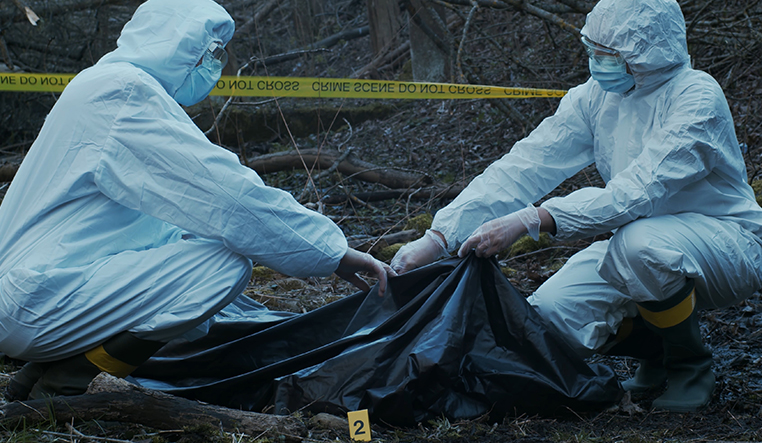Dickson Murder and Homicide Defense Lawyer
When you are facing murder or homicide charges, you need a Dickson criminal defense warrior

Contact Waynick Law
When faced with accusations of murder or homicide in Dickson, Tennessee, the stakes are incredibly high, and your legal challenges can feel overwhelming. At Waynick Law, our dedicated criminal defense attorney is here to provide you with the aggressive and knowledgeable representation you need to navigate these serious charges. Whether you're dealing with first-degree murder, manslaughter, or any other form of homicide, we will meticulously investigate your case, develop a robust defense strategy, and fight tirelessly to protect your rights and future. Trust us to be your steadfast warriors in the pursuit of justice and the defense of your freedom. Call us today.

How can we help?
What are the different types of homicide charges in Tennessee?
Homicide charges encompass a range of offenses, each with varying degrees of severity and legal consequences. Here’s a breakdown of the different types of homicide charges:
- First-degree murder: The intentional and premeditated killing of another person. This is the most serious form of homicide. If convicted, the penalty can be life imprisonment without the possibility of parole or, in some cases, the death penalty.
- Second-degree murder: The intentional killing of another person, but without the premeditation required for first-degree murder. It can also involve acts that are done with a depraved indifference to human life. Convictions typically result in a sentence of 15 to 60 years in prison, depending on factors such as prior criminal history.
- Voluntary manslaughter: The intentional killing of another person that occurs in the heat of passion, provoked by circumstances that would cause a reasonable person to lose self-control. It is considered a less severe offense than first or second-degree murder. Sentences range from three to 15 years in prison.
- Involuntary manslaughter: The unintentional killing of another person resulting from criminal negligence or recklessness. This charge often applies to cases where the death resulted from an unlawful act not amounting to a felony. Convictions can result in two to 12 years in prison.
- Criminally negligent homicide: The killing of another person through criminal negligence, which involves a gross deviation from the standard of care that a reasonable person would exercise. Sentences typically range from one to six years in prison.
- Felony murder: A killing that occurs during the commission of a dangerous felony, such as robbery or burglary, even if the death was unintentional. This is treated as first-degree murder, carrying similar severe penalties.
Each type of homicide charge in Tennessee is treated with different levels of severity and legal implications, depending on the circumstances surrounding the offense and the defendant’s intent or negligence. If facing any of these charges, consult with the experienced criminal defense attorneys at Waynick Law to navigate the complexities of the legal system.
Contact Waynick Law

What is vehicular homicide?
Vehicular homicide in Tennessee is a specific type of criminal charge that involves the killing of another person through the operation of a motor vehicle. It typically falls under categories related to reckless or negligent driving.
Charges for vehicular homicide arise when a person causes the death of another through the negligent, reckless, or intoxicated operation of a vehicle. It involves a fatal accident where the driver’s conduct was significantly below the standard of care expected from a reasonable driver.
Vehicular homicide by intoxication
These charges involve killing another person while driving under the influence of alcohol or drugs. The impairment must be significant enough to affect the driver’s ability to operate the vehicle safely. This is classified as a Class B felony, punishable by eight to 30 years in prison. The severity of the penalty can be influenced by factors such as prior convictions or the presence of aggravating circumstances.
Vehicular homicide by recklessness
Causing a fatal accident through extremely reckless driving behavior, such as excessive speeding or ignoring road rules, but without being under the influence. This is classified as a Class C felony, carrying a potential sentence of three to 15 years in prison. Penalties can vary based on the specifics of the case and the defendant’s criminal history.
Vehicular homicide by criminal negligence
Resulting in a fatality through a gross deviation from the standard of care, such as texting while driving or failing to stop at a red light, without the intent to harm but through significant negligence. Classified as a Class D felony, punishable by two to 12 years in prison. The exact sentence can depend on additional factors, including any prior offenses or mitigating circumstances.
Vehicular homicide is a serious charge with severe consequences, reflecting the significant impact of a fatal accident caused by a driver’s behavior. If facing such charges, it's essential to seek aggressive legal representation to navigate the complexities of your case and work towards the best possible outcome. At Waynick Law, we relentlessly fight for your rights.
How can your Dickson murder and homicide defense attorney help with my case?
Our Dickson murder and homicide defense attorney is dedicated to providing you with a rigorous and comprehensive defense against serious charges. Here’s how we can assist with your case:
- Thorough case evaluation: We meticulously review all evidence related to your case, including police reports, witness statements, and forensic evidence. This allows us to identify potential weaknesses in the prosecution’s case and to develop a robust defense strategy tailored to your specific situation.
- Expert witnesses and evidence: Our team works with expert witnesses, such as forensic analysts and accident reconstruction specialists, to challenge the accuracy of the evidence presented against you. Their testimony can provide critical insights and potentially refute key aspects of the prosecution’s case.
- Challenging evidence and procedures: We scrutinize the legality of evidence collection and ensure that your rights were upheld during the investigation. If any evidence was obtained unlawfully, we can argue to have it suppressed, which can significantly weaken the prosecution’s case.
- Building a strong defense: We explore all possible defenses, such as self-defense, lack of intent, or mistaken identity, depending on the details of your case. Our goal is to build a compelling defense that challenges the prosecution’s narrative and supports your innocence.
- Negotiating plea deals: If a trial is not in your best interest, we can negotiate with the prosecution to seek a favorable plea deal. This could involve reducing charges or penalties to mitigate the impact of a conviction on your life.
- Representation in court: Our attorney will represent you in all court proceedings, from preliminary hearings to trial. We advocate fiercely on your behalf, presenting a strong defense and working to secure the best possible outcome for your case.
- Providing emotional and legal support: Facing murder or homicide charges can be an incredibly stressful experience. We offer compassionate support throughout the legal process, ensuring that you understand your options and feel confident in your defense.
By working with Waynick Law, you have a dedicated team committed to protecting your rights and fighting for your future. We leverage our experience and resources to defend you from accusations, allegations, and criminal charges.

What are potential defenses to homicide charges in Dickson?
Defending against homicide charges in Dickson involves exploring a range of potential defenses tailored to the specifics of the case. Here are some common defenses that may apply:
- Self-defense: In self-defense claims, we argue that the defendant acted to protect themselves from imminent harm or death. This defense is used if the defendant reasonably believed that they were in immediate danger and that deadly force was necessary to protect themselves.
- Defense of others: Similar to self-defense, this defense argues that the defendant used force to protect another person from imminent harm or death. The defendant must demonstrate that their actions were reasonable and that they had a genuine belief that the person they were defending was in immediate danger.
- Lack of intent: Here, the argument is that the defendant did not have the intent to kill, which is necessary for charges like first-degree murder. This defense is relevant in cases of charges like second-degree murder or voluntary manslaughter, where intent is a critical element.
- Accident or mistake: This defense argues that the death was the result of an accident or a mistake rather than criminal conduct. The defense would argue that the defendant’s actions were not intended to cause harm and that the resulting death was an unintended consequence.
- Insanity or mental incapacity: This defense asserts that the defendant was not mentally competent at the time of the crime and thus could not be held criminally responsible. This defense requires substantial evidence of mental illness or a condition that impaired the defendant’s ability to understand the nature of their actions.
- Alibi: An alibi provides evidence that the defendant was somewhere else at the time the crime was committed. This defense relies on demonstrating that the defendant couldn’t have committed the homicide because they were not present at the scene.
- Lack of evidence: Involves the argument that the prosecution does not have enough evidence to prove beyond a reasonable doubt that the defendant committed the crime. The defense can challenge the reliability or admissibility of evidence presented by the prosecution or demonstrate that the evidence is insufficient to support a conviction.
- Unlawful search and seizure: This involves claims that evidence obtained by law enforcement was acquired through illegal means, such as a violation of the defendant’s constitutional rights. If successful, this defense can lead to the exclusion of key evidence that may weaken the prosecution’s case.
- Coercion or duress: This defense asserts that the defendant was forced to commit the homicide under threat of imminent harm. This defense is applicable if the defendant acted under extreme pressure from another person who threatened their life or safety.
Remember, each case is unique, and the effectiveness of these defenses depends on the specific facts and circumstances surrounding the homicide charges. Consulting with a skilled Dickson criminal defense attorney is vital to determine the best strategy for your particular situation and to mount a strong defense.
Do you have a Dickson murder and homicide defense attorney near me?
Waynick Law PLLC serves clients out of its office at 504 E. College Street, Dickson, TN 37055. We have an additional office in Nashville. If you are unable to come to our offices, we can make arrangements to meet with you elsewhere.
Facing murder or homicide charges in Nashville? We are here to fight for you
Don't wait another moment—take charge of your defense now. Contact the battle-tested legal team at Waynick Law immediately to confront your homicide charges head-on. We’re ready to dig deep, challenge every piece of evidence, and fight relentlessly for your freedom. Every second counts in a case as serious as this, so act now to secure the aggressive and strategic defense you need. Call us today, and let us start building your defense to secure the justice you deserve. To schedule a meeting with an experienced criminal defense attorney, simply call our offices or fill out our contact form.
